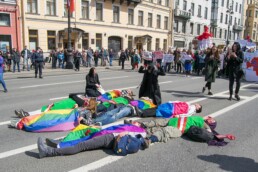“Rainbow Railroad” Provides LGBT Chechens Asylum and Protection
Chechnya, a federal subject of Russia, is a predominantly-conservative Muslim society that discriminates against homosexuals, going as far as denying their existence in their territory. In 2017, human rights groups reported that Chechen officials detained, beat, and tortured gay men. This detention and torture was used to shame them, identify them to their families, and extract information regarding other gay men.
After their release, the men were at risk of honour killings at the hands of their family members because of their sexuality. As a result, many chose to flee Chechnya. These men wound up in safe houses in other cities in Russia under the protection of the Russian LGBT Network. Despite fleeing elsewhere in Russia, they were still at risk of being discovered by Chechen officials or their disapproving family members.
Canada’s Role in Providing Asylum
In June, Canadian officials led by Foreign Affairs Minister Chrystia Freeland started working with non-governmental organizations, such as the Russian LGBT Network and Rainbow Railroad, to identify homosexual Chechens at risk and offer them asylum in Canada. It is estimated that 31 men and women from Chechnya (many of whom had been detained and tortured by officials earlier this year) are now either in Canada or making their way safely.
Russia’s Response and Legal Concerns
Russia will likely not be pleased with the fact that its citizens are leaving the country, as it makes it appear that Russia can’t or won’t protect its citizens. Russia warned the program would lead to consequences for violating Russian law. It is, however, unclear whether this program does so.
As it stands, the program does not violate international refugee law. The United Nations Convention on Refugees defines a refugee as “someone who is outside their home country and cannot return to that home country because of a well-founded fear of persecution.” Chechens do not meet this definition because they were identified in their home country, and therefore normal refugee procedures had to be bypassed in admitting them to Canada.
Canada is not necessarily bound by the Convention if they go into a foreign country as part of a humanitarian effort to help people they consider to be persecuted.
This type of intervention is not unprecedented, as Canada has previously identified persons in need of protection that were still in their home country and brought them to Canada, dating back to the 1980s. In this case, as government-assisted refugees, the Chechen men will receive financial support for one year. It remains to be seen what long-term solutions Russia will provide to protect these men.
Share this article
Arghavan Gerami
Arghavan Gerami is the Founder and Senior Counsel at Gerami Law Professional Corporation ('PC'), a full-service immigration law firm in Ottawa, Ontario. Since 2011, Ms. Gerami has focused her practice on immigration and refugee litigation. Prior to that, Ms. Gerami worked at the Ministry of Attorney General and the Department of Justice and had the privilege of serving the Honourable Mr. Justice M. Evans at the Federal Court of Appeal on immigration and administrative law appeals. Ms. Gerami contributes to the Immigration Law Section of the Canadian Bar Association, the Canadian Association of Refugee Lawyers, and the United Nations High Commissioner for Refugees. Ms. Gerami has also published numerous journal articles and presented at various immigration and refugee law conferences and events across Canada.

